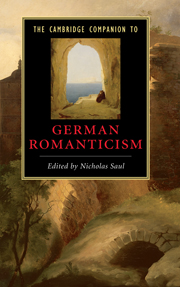Book contents
- Frontmatter
- 1 What is Romanticism, and where did it come from?
- 2 From early to late Romanticism
- 3 Prose fiction of the German Romantics
- 4 The Romantic lyric
- 5 The Romantic drama
- 6 Forms and objectives of Romantic criticism
- 7 Romanticism and Classicism
- 8 Women writers and Romanticism
- 9 The Romantics and other cultures
- 10 Love, death and Liebestod in German Romanticism
- 11 Romantic philosophy and religion
- 12 Romantic politics and society
- 13 Romantic science and psychology
- 14 German Romantic painters
- 15 Romanticism and music
- 16 Transformations of German Romanticism 1830-2000
- Key authors and their works
- Further reading
- Index
15 - Romanticism and music
Published online by Cambridge University Press: 28 September 2010
- Frontmatter
- 1 What is Romanticism, and where did it come from?
- 2 From early to late Romanticism
- 3 Prose fiction of the German Romantics
- 4 The Romantic lyric
- 5 The Romantic drama
- 6 Forms and objectives of Romantic criticism
- 7 Romanticism and Classicism
- 8 Women writers and Romanticism
- 9 The Romantics and other cultures
- 10 Love, death and Liebestod in German Romanticism
- 11 Romantic philosophy and religion
- 12 Romantic politics and society
- 13 Romantic science and psychology
- 14 German Romantic painters
- 15 Romanticism and music
- 16 Transformations of German Romanticism 1830-2000
- Key authors and their works
- Further reading
- Index
Summary
During the second half of the eighteenth century in Europe a remarkable change occurred in the evaluation and understanding of music. From being widely regarded as something to be used to accompany social and religious occasions, rather than be listened to and played for its own sake, music came to be regarded by some influential writers, philosophers and composers as the source of revelations that were inaccessible to any other form of human expression. This change in the reception of music paralleled the remarkable flowering in the production of music in Germany from the later eighteenth to the end of the nineteenth century in the work of, among others, Joseph Haydn, Wolfgang Amadeus Mozart, Ludwig van Beethoven, Franz Schubert, Felix Mendelssohn, Robert Schumann, Johannes Brahms and Richard Wagner. The status of music in this period is connected to new interpretations of language and subjectivity associated with Romanticism, and these interpretations affect many widely held theoretical assumptions. Philosophical accounts of music still, for example, tend to assume that music is a mystery which needs to be explained in a philosophical theory. However, conceptual and aesthetic developments associated with Romanticism already put this assumption into question, because it depends on the idea that the primary function of language is to represent the objective world.
- Type
- Chapter
- Information
- The Cambridge Companion to German Romanticism , pp. 243 - 256Publisher: Cambridge University PressPrint publication year: 2009
- 15
- Cited by

